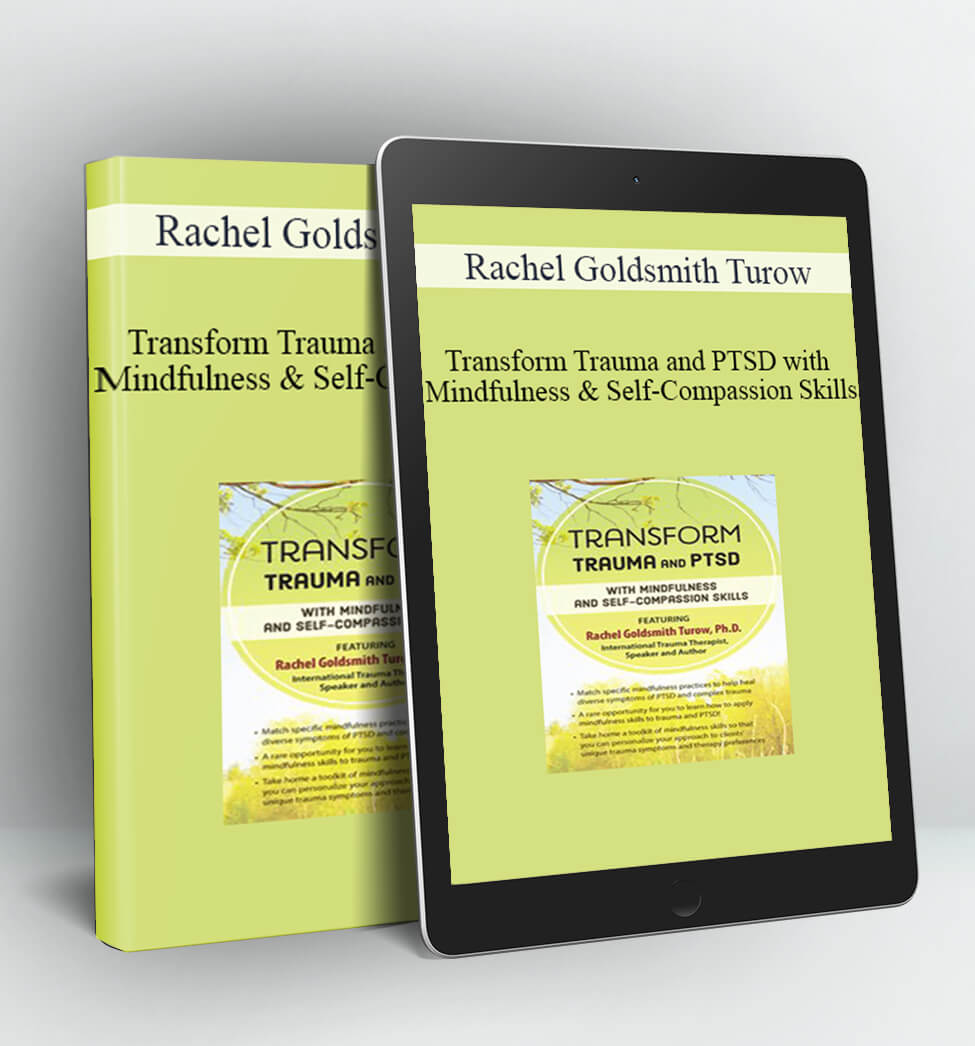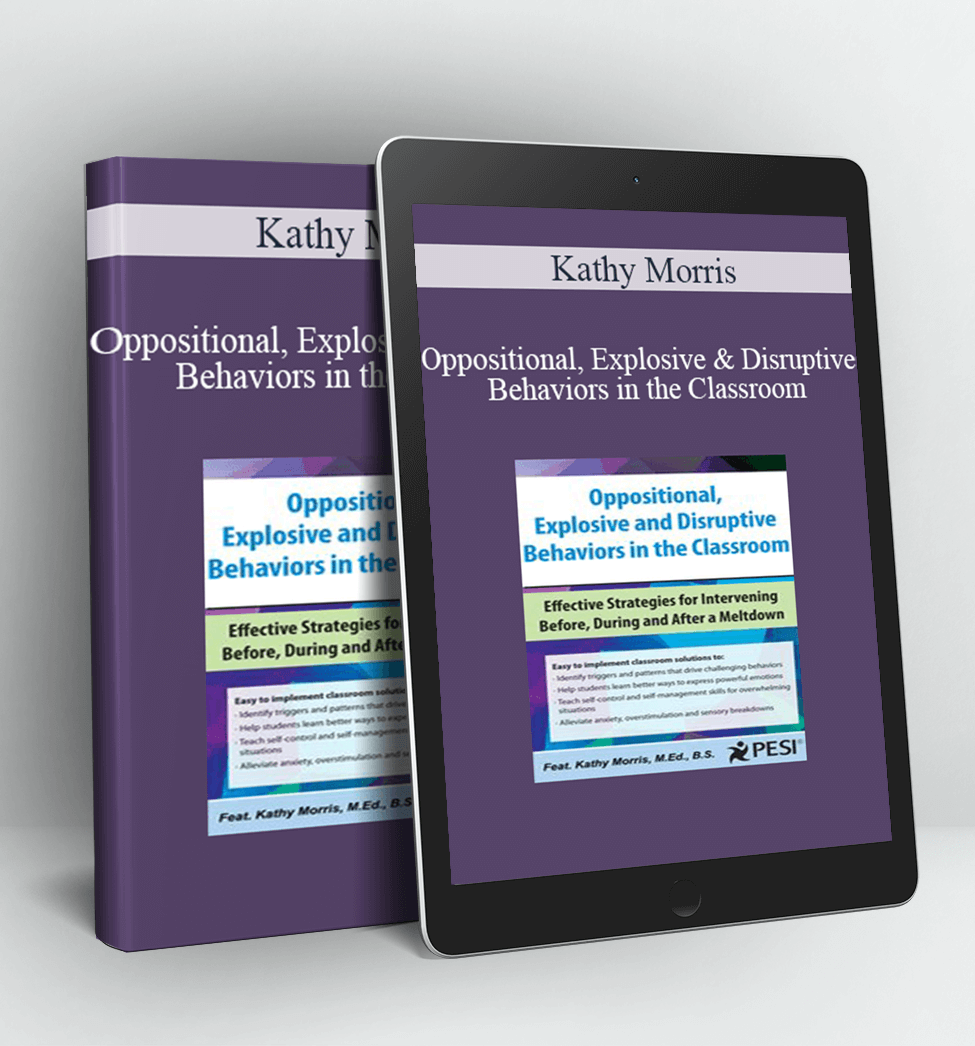Transform Trauma and PTSD with Mindfulness and Self-Compassion Skills – Rachel Goldsmith Turow
- Faculty:
- Rachel Goldsmith Turow
- Duration:
- 6 Hours 11 Minutes
- Format:
- Audio and Video
- Copyright:
- Mar 29, 2018
Description
- Match specific mindfulness practices to help heal diverse symptoms of PTSD and complex trauma
- A rare opportunity for you to learn how to apply mindfulness skills to trauma and PTSD!
- Discover a toolkit of mindfulness skills so that you can personalize your approach to clients’ unique trauma symptoms and therapy preferences
The multitude of difficulties stemming from trauma – emotional, cognitive, physical, spiritual, and relational-can overwhelm both trauma survivors and you as their clinician. You face a unique constellation of challenges with each client. Luckily, mindfulness practices can provide bountiful avenues towards trauma recovery and posttraumatic growth. Mindfulness skills offer an ideal synthesis of focusing on the “here and now” and healing layers of trauma-related distress. Using specific mindfulness techniques, you can target each client’s unique symptom profile to reduce experiences such as:
- Anxiety
- Avoidance
- Depression
- Hypervigilance
- Dissociation
- Self-criticism, self-blame, and self-hatred
- Intrusions
- Relationship disturbances
Beyond decreasing symptoms of trauma and PTSD, mindfulness skills can provide a lasting foundation for overall health, resilience, and well-being.
Join Dr. Turow, author of Mindfulness Skills for Trauma and PTSD: Practices for Recovery and Resilience (Norton Professional Books, 2017), as she distills her clinical and research expertise to pinpoint specific mindfulness techniques for common responses to trauma. By implementing these skills in your practice, you can confidently guide traumatized clients to tolerate and transform distress, promote bodily relaxation, and shift self-criticism to self-compassion.
Handouts
| Manual (1.10 MB) | 59 Pages | Available after Purchase |
Outline
- Relevance for Trauma
- The role of mindfulness and self-compassion in evidence-based therapies for PTSD
- Cognitive Processing Therapy
- Prolonged Exposure
- Non-judgment, metacognition and re-perceiving in the context of trauma-related:
- Shame
- Guilt
- Self-criticism
- Self-blame
- Direct attention to help with trauma related symptoms such as:
- Intrusions
- Anxiety
- Depression
- Dissociation
- Skills to build bodily and emotional awareness after:
- Avoidance
- Numbing
- Dissociation
- Common misconceptions and stumbling blocks
- The role of mindfulness and self-compassion in evidence-based therapies for PTSD
- Mindfulness Practices for Trauma and PTSD
- The scientific evidence for trauma:
- Mindfulness-Based Stress Reduction (MBSR)
- Loving Kindness Meditation (LKM)
- Mindfulness-Based Cognitive Therapy (MBCT)
- Mindfulness-Based Exposure Therapy (MBET)
- How mindfulness and self-compassion decrease psychological symptoms
- Evidence-based specific mindfulness practices for survivors of:
- Interpersonal violence
- Childhood emotional, physical, and sexual abuse
- Combat trauma
- Military sexual trauma
- Disasters
- The scientific evidence for trauma:
- Match Mindfulness & Self-Compassion Skills to Trauma-Related Symptoms
- Mindfulness skills for specific challenges:
- DSM-5® PTSD symptoms
- Depression
- Anxiety
- Substance abuse
- Relationships
- Mindfulness practices for complex trauma and post-trauma worldviews
- Build compassion and self-compassion after trauma
- Mindfulness skills for specific challenges:
- Experiential Training in Mindfulness & Self-Compassion Skills for Trauma and PTSD
- There’s more in this moment: Broaden attention to reduce suffering
- Practice the small stuff to train for the big stuff— from a single breath to feared actions
- Respect and re-appraise intrusions, core beliefs, and self-judgment about having PTSD
- Bodily awareness and relaxation to manage hypervigilance/hyperarousal
- Self-compassion and loving-kindness for trauma,
- PTSD and self-criticism
- Special Considerations when Practicing Mindfulness for Trauma
- Client safety, choice and empowerment with respect to bodily practices
- Non-pathologizing stance to trauma symptoms and treatment obstacles
- Balance neutral mindfulness practices to build skills with practices related to trauma symptoms
- Calibrate exposure to distressing material both within therapy and between sessions
- Mindfulness & Self-Compassion Practices for the Clinician to Prevent Burnout
- Balancing attention to self and other
- Therapist mindfulness and self-compassion practice improves client outcomes
- Modeling mindfulness and discerning self-disclosure
- Prevent burnout; differentiate between empathy, compassion fatigue and compassion satisfaction
Faculty
Rachel Goldsmith Turow, Ph.D. Related seminars and products: 2
Rachel Goldsmith Turow, Ph.D., is a clinical psychologist, research scientist, and adjunct faculty member at Seattle University and the Icahn School of Medicine at Mount Sinai. In her clinical work, she has provided a range of treatments for trauma and related challenges, including “Self-Talk” therapy groups that integrate lovingkindness meditation and cognitive behavioral skills to transform self-criticism into self-encouragement. Dr. Turow’s research program addresses the ways that emotion regulation, self-compassion, trauma appraisals, and social contexts influence trauma recovery. As a faculty member of Rush University Medical Center, Dr. Turow started the hospital’s Dialectical Behavior Therapy-based program, supervised psychology and medical trainees, and trained military medical personnel to manage others’ trauma responses during deployment.
Dr. Turow has written dozens of scientific articles and chapters, along with the book Mindfulness Skills for Trauma and PTSD: Practices for Recovery and Resilience. She is a reviewer for several professional journals and serves on the Scientific Advisory Board for the International Society for the Study of Trauma and Dissociation.
Speaker Disclosures:
Financial: Rachel Goldsmith Turow is an adjunct faculty at Seattle University. She receives a speaking honorarium from PESI, Inc.
Non-financial: Rachel Goldsmith Turow has no relevant non-financial relationship to disclose.
Access Download Transform Trauma and PTSD with Mindfulness and Self-Compassion Skills – Rachel Goldsmith Turow right now!
Delivery Method:
After your purchase, you’ll get access to the downloads page. Here, you can download all the files associated with your order.
Downloads are available once your payment is confirmed, we’ll also send you a download notification email separate from any transaction notification emails you receive from Vinlearn.




